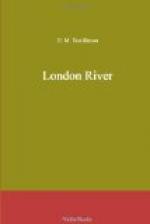At a corner where the broad main channel of electric light ended, and perplexity began, a policeman stood, and directed me into chaos. “Anywhere,” he explained, “anywhere down there will do.” I saw a narrow alley in the darkness, which had one gas lamp and many cobbled stones. At the bottom of the lane were three iron posts. Beyond the posts a bracket lamp showed a brick wall, and in the wall was an arch so full of gloom that it seemed impassable, except to a steady draught of cold air that might have been the midnight itself entering Limehouse from its own place. At the far end of that opening in the wall was nothing. I stood on an invisible wooden platform and looked into nothing with no belief that a voyage could begin from there. Before me then should have been the Thames, at the top of the flood tide. It was not seen. There was only a black void dividing some clusters of brilliant but remote and diminished lights. There were odd stars which detached themselves from the fixed clusters, and moved in the void, sounding the profundity of the chasm beneath them with lines of trembling fire. Such a wandering comet drifted near where I stood on the verge of nothing, and then it was plain that its trail of quivering light did not sound, but floated and undulated on a travelling road—that chasm before me was black because it was filled with fluid night. Night, I discovered suddenly, was in irresistible movement. It was swift and heavy. It was unconfined. It was welling higher to douse our feeble glims and to founder London, built of shadows on its boundary. It moved with frightful quietness. It seemed confident of its power. It swirled and eddied by the piles of the wharf, and there it found a voice, though that was muffled; yet now and then it broke into levity for a moment, as at some shrouded and alien jest.
There were sounds which reached me at last from the opposite shore, faint with distance and terror. The warning from an unseen steamer going out was as if a soul, crossing this Styx, now knew all. There is no London on the Thames, after sundown. Most of us know very little of the River by day. It might then be no more native to our capital than the Orientals who stand under the Limehouse gas lamps at night. It surprises us. We turn and look at it from our seat in a tram, and watch a barge going down on the ebb—it luckily misses the piers of Blackfriars Bridge—as if a door had unexpectedly opened on a mystery, revealing another world in London, and another sort of life than ours. It is as uncanny as if we had sensed another dimension of space. The tram gets among the buildings again, and we are reassured by the confined and arid life we know. But what a light and width had that surprising world where we saw a barge drifting as leisurely as though the narrow limits which we call reality were there unknown!
But after dark there is not only no River, when you stand where by day is its foreshore; there is no London. Then, looking out from Limehouse, you might be the only surviving memory of a city that has vanished. You might be solitary among the unsubstantial shades, for about you are only comets passing through space, and inscrutable shapes; your neighbours are Cassiopeia and the Great Bear.




